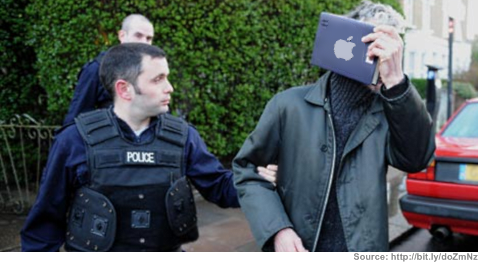iPhone-leak-gate: Who are the 'journalists' nowadays, anyway?

The news of the expected upcoming iPhone 4G being lost by an employee, bought and published by a technology news website was exciting enough, but to learn that the editor of the publishing site has had his house raided by police through a court order is mind-blowing to say the least.
This is a highly interesting breaking news story in that online privacy issues are being brought offline through legal proceedings.
- Read more: Cops raid Gizmodo editor's home (BTL)
- Read more: Police seize Gizmodo editor's computers (CNET)

Hopefully you would have read (links above) about the raid on the Gizmodo editor's house in order to identify the source of the person selling the iPhone prototype after it was found in a bar with no owner, an Apple employee, in sight.
Obvious disclaimer: I am not a lawyer, solicitor or in any way, shape or form constituted as legal counsel. I'm young, gobby, a bit naive at times, but it isn't impossible to be at least semi-astute in hearing, understanding and disseminating such news. This post, though brief and in no way getting into every detail under the sun of the law, morals and definitions, is nothing short of thoughts from a Generation Y perspective.
I'm British, so my angle of the law is somewhat different to that of the average American. However as someone who has to obey US law as well as UK law when publishing posts, I am aware that First Amendment rights basically mean (in a nutshell) that the rights of journalists' free speech should be acknowledged in particular to protecting sources in articles.
But what constitutes a journalist in this day and age? Do I even consider myself a journalist? In my world there are two sides to it. Either I can call myself a blogger and not be taken too seriously by my student peers, or I can call myself a professional journalist which makes me look and sound like an arrogant arse.
Citizen journalism is not only huge, but also taking over traditional reporting, with members participating without necessarily realising their impact on the world. A single tweet can spread across the globe in seconds and each individual submitting their perspective in a crisis, event or situation can be crucial in gaining the wider picture and perspective.
So even though the First Amendment's three clauses in particular - two focusing on specifically "the press" and "the rights of the people" - pretty much encompasses every US citizen or foreign national on US soil. So why are "the press" so especially singled out?
I believe truly, as I also believe many of the Generation Y do so also, that whistle-blowing actions which the wider world "should" see is in the benefit of the public. The Wikileaks video of the US Army killing of a Reuters photographer in Baghdad in 2007 highlights this example perfectly. There is a major difference in bringing news such as this to light than that of a new iPhone in the works, however.
The difference is the public versus private sector. The US Army is a public sector entity, where the taxpayers as the electorate can hold the government accountable for their actions. In the private sector though, the public have less rights to hold them accountable without going through the entire rigmarole of court proceedings and legal channels. If the world "should" know about the US Army video, should the world know about the upcoming iPhone?
So what's the difference between Wikileaks - a whistle-blowing website publishing documents that no government wants the world to see - and Gizmodo and other tech sites publishing photos of an unreleased device? I could draw an example of "technology paparazzi" in some respects; instead of the press paying thousands for a photo of the underskirt of a celebrity as they exit a car, the tech press pay thousands to get their hands on a new, unreleased phone.
The two, in my eyes, are both almost exactly the same yet polar opposites at the same time.
One of my favourite sayings is that, "there is always at least a dozen sides to every story". Usually they will balance out with half taking one side and the other taking the other side; perhaps that is why we have a prosecution and defense as defendants in court.
Though in this case, I strongly suspect - though I cannot and probably never will prove it - that Apple is strongly taking advantage in this case in order to, almost understandably, protect its industrial secrets, and also its future stock and share prices.
Yet ultimately it boils down to one very simple, almost poignant point which the Generation Y - an entire generation of youth brought up on the loose, undefined morals and ethics of social communication - that once something goes on the web, it can never be taken back, and you should still be able to be held accountable for your actions and words.